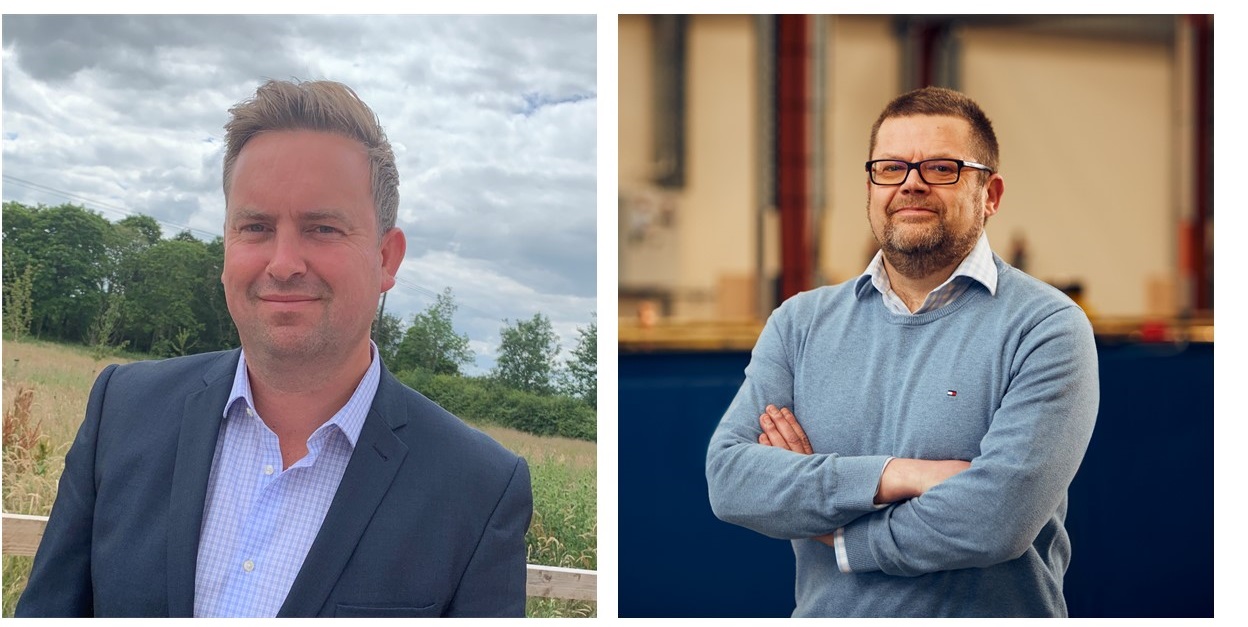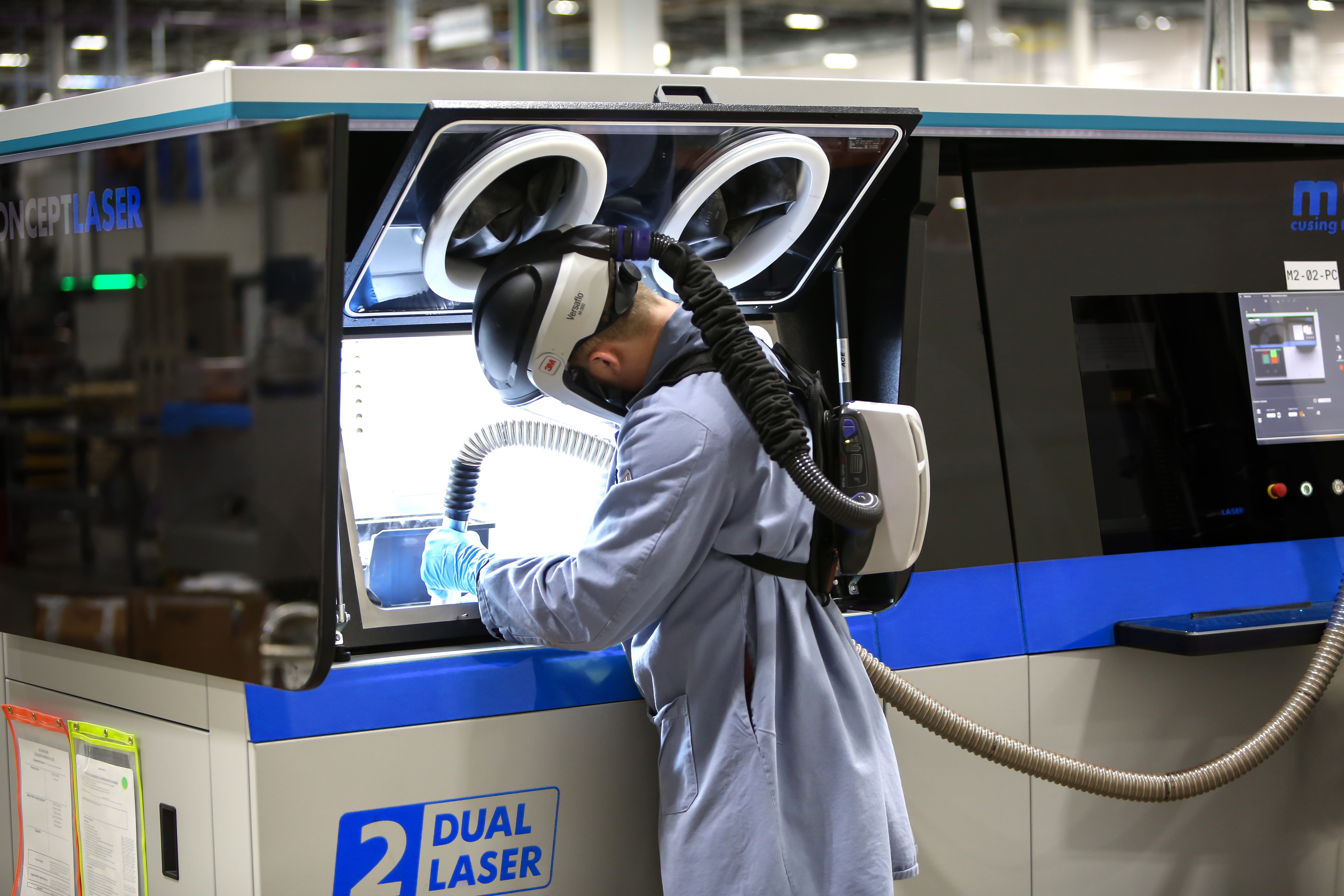Q&A with Mathew Marsh, commercial director
ICD Applied Technologies was established in Sheffield in the UK at the end of last year. The company, which is part of the ICD Group, recently announced its investment in GE Additive technology with the acquisition of a GE Additive Concept Laser M2 system.
Steven Wilcox, GE Additive’s sales director for UK, Ireland and Scandinavia caught up with Mathew Marsh ICD Applied Technologies’ commercial director to hear their plans and his thoughts on the potential for additive in the UK.
 (L to R: Steve Wilcox, GE Additive, Mathew Marsh, ICD Applied Technologies)
(L to R: Steve Wilcox, GE Additive, Mathew Marsh, ICD Applied Technologies)
Mat, could you tell us about ICD Applied Technologies and your additive journey to date?
Well, as we only established the company in late 2020, in relative terms - although we have placed additive technology at core of our business - our additive journey is only just getting started.
We founded the company with a simple desire to manufacture complex components by combining well-established, conventional manufacturing technologies such as electroforming with state-of-the-art technologies such as additive manufacturing. Our aim is to be a metal solutions provider in the world of complex and demanding component manufacture.
Your business plans to scale. Looking further ahead, how does your investment in additive help you maintain momentum and ultimately achieve your business goals?
It is scaling fast and it’s thanks to the vision and unprecedented support of the ICD Group. With a desire to build on the back of materials excellence and capability ICD Applied Technologies is the perfect vehicle for this.
ICD Group is well engrained in the metals supply chains and are already working closely with several OEMs, supplying both primary and secondary materials.
The move into component manufacturing is the logical next step in becoming increasingly vertically integrated as a business. The investment in additive technology is the perfect step for us into component manufacturing and complements our investment in other technologies and capabilities. Whilst it is our first machine, I have no doubt our GE Additive Concept Laser M2 will eventually lead to multiple additive machines to support our business goals and objectives.
The M2 is the workhouse of our fleet and we see customers around the world deploying them in many ways. What are your plans for the technology?
Our plans for the technology are simple. We aim to offer a rapid response to net shape component manufacturing across multiple materials and sectors.
We have no desire to move into mass manufacturing but instead focus on excellence and doing difficult things well. We want to be a solutions provider but over time be a leader in complex component manufacturing.
In our opinion the M2 is the perfect machine for this at this stage in our additive journey and compliments our other investments in advanced machining and developments in powder metallurgy and electroforming.

Aerospace is a key market for you. This industry was an early adopter of additive and continues to be super user. Do you sense the same enthusiasm for additive across the UK’s aerospace manufacturing ecosystem?
The enthusiasm for additive technology grows by the day, this is not only within the aerospace sector but across multiple industries and market sectors.
We operate today in an environment where increasingly complex component requirements and material solutions are required across all markets and additive manufacturing allows us to operate in that space.
Aerospace is a super user and pioneer of additive technology, but this only drives the adoption in other areas, and this is something we want to capitalise on.
Casting a wider view across the UK, do you see any trends or have a view on how additive is being adopted and where there might be untapped potential?
You can see examples across many market sectors across the UK where additive has been adopted to varying degrees and I can only see this developing and expanding further.
The use of materials globally and the environmental pressures to use materials in a much more yield friendly manner, plus the constant advancement in the capability of additive and metals technology will inevitably push the adoption of this technology further in many industrial sectors.
In addition to environmental drivers, component light weighting, increasingly organic complex shapes in complex materials is too much to ask of existing technologies.
You wear the ‘Made in Sheffield’ hallmark with pride. How is advanced manufacturing and additive complementing conventional methods in the UK’s industrial heartlands?
Sheffield is a centre for manufacturing, engineering excellence and metals development and is very close to my heart. Being from Sheffield myself I identify very closely with the “Made in Sheffield” mark and wanting to contribute to the manufacturing future of this great city makes me very proud.
Sheffield’s famous steel heritage, its world famous forging and casting businesses and today developing new partnerships with local universities & industry, Sheffield is attracting large OEMs such as McLaren and Boeing, through the development of the Advanced Manufacturing Park (AMP) and Advanced Manufacturing Research Centre (AMRC).
Over my career I have had the privilege to work at two very important companies embedded in the fabric of Sheffield’s history but also pivotal to the city’s future, Forgemasters and Doncasters. From first-hand experience I understand and see that additive manufacturing simply compliments the manufacture of huge forgings and complex demanding castings.
Technology does advance - driven by capability, social and environmental requirements, but as a place, advanced engineering and manufacturing is at the heart of Sheffield’s capability and additive manufacturing is simply the next part along that journey.